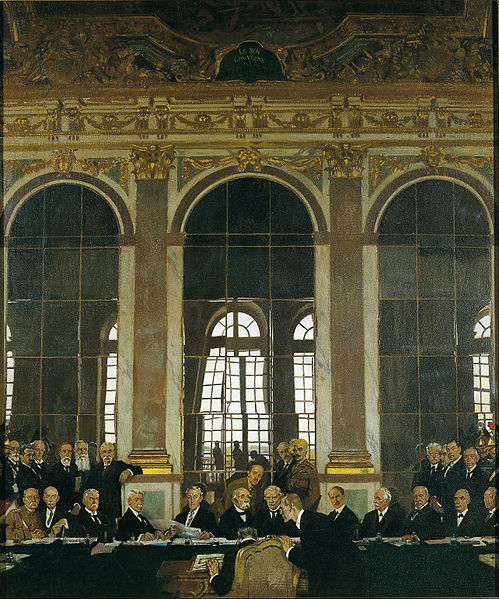Learn
In Unit 7, you learned about the unification of Germany and you studied a painting of Kaiser Wilhelm I, the first King of a unified Germany, and Otto von Bismarck, the mastermind who arranged it, in the Hall of Mirrors at the Palace of Versailles in France shortly after they defeated the French in the Franco-Prussian War celebrating their unification. In the aftermath of World War I, they are no longer the victors but must return to be humiliated by the treaty terms at the very same palace. Ironic?

Woodrow Wilson, then President of the United States, knew that there might be problems if the peace settlement were not a fair one. He developed his Fourteen Points to help guide the European leaders to develop a fair peace. He also recommended the establishment of a League of Nations that would use diplomacy rather than war to settle disputes. Read Woodrow Wilson's Fourteen Points. Be sure to click on the link in the fourteenth point about League of Nations. You will see the information on your test!
To help you understand the impact of the war on the different countries, read and watch the videos at The Great War: The Challenges of Making Peace. You should go through all 11 pages, but do not have to complete the writing activities.
Now look at the changed map of Europe. Notice
- the territories and colonial holdings that were stripped from Germany
- their having to accept the War Guilt Clause, Article 231
- the requirement of Germany to pay reparations to all of the belligerents
How did the United States feel about the terms of the treaty? Remember that Woodrow Wilson left the United States to travel to France to try to negotiate a peace according to the Fourteen Points that he had established in order to make sure the peace was fair and not a treaty of revenge. When he brought back the treaty for the U.S. Congress to ratify, they refused. He traveled the country to gain support but support never came because of the harsh terms of the treaty, especially that Germany had such an enormous amount of reparations to pay. Congress also disagreed with Article 10 of the League of Nations which Americans felt took away their war powers, giving them to the League. They wanted to stay out of European problems, and as David Lloyd George of England correctly predicted, "We shall have to fight another war again in 25 years."
The United States negotiated a separate peace with Germany after the Treaty of Versailles - the Treaty of Berlin in 1921 - and never joined the League of Nations. How do you think President Wilson felt about this?
